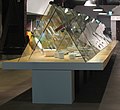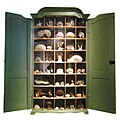The Museums Portal
A museum (/mjuːˈziːəm/ mew-ZEE-əm) is an institution dedicated to displaying and/or preserving culturally significant objects. Many museums have exhibitions of these objects on public display, and some have private collections that are used by researchers and specialists. Compared to a library, a museum hosts a much wider range of objects and usually focus around a specific theme such as the arts, science, natural history, local history, and other topics. Public museums that host exhibitions and interactive demonstrations are often considered to be tourist attractions, and many museums attract large numbers of visitors from outside their host country, with the most visited museums in the world regularly attracting millions of visitors annually.
Since the establishment of the earliest known museum in ancient times, museums have been associated with academia and the preservation of rare items. Museums originated as private collections of interesting items, and not until much later did the emphasis on educating the public take root. (Full article...)
Selected museum
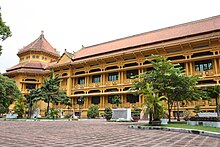
The Vietnam National Museum of History (Vietnamese: Viện Bảo tàng Lịch sử Việt Nam) is in the Hoan Kiem district of Hanoi, Vietnam. The museum building was an archaeological research institution of the French School of the Far East under French colonial rule (Louis Finot École Française d'Extrême-Orient EFEO) of 1910, was extensively refurbished in 1920. It was redesigned between 1926 and 1932 by architect Ernest Hébrard. The museum was acquired by the government of North Vietnam (now the government of Vietnam) in 1958 and then the artifact collections were expanded to cover eastern arts and national history.
The museum highlights Vietnam's prehistory (about 300,000–400,000 years ago) up to the August 1945 Revolution. It has over 200,000 exhibits displayed covering items from prehistory up to the 1947 revolution and founding of the Democratic Republic of Vietnam, arranged in five major sections. (Full article...)
Selected interior image
Selected general article
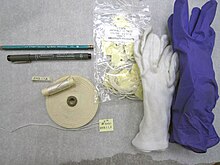
A museum/library/archival registrar is responsible for implementing policies and procedures that relate to caring for collections of cultural institutions like archives, libraries, and museums. These policies are found in the museum's collections policy, the guiding tenet of the museum explaining why the institution is in operation, dictating the museum's professional standards regarding the objects left in its care. Registrars focus on sections that include acquisitions, loans, exhibitions, deaccessions, storage, packing and shipping, security of objects in transit, insurance policies, and risk management.
As a collections care professional, they work with collection managers, conservators, and curators to balance public access to objects with the conditions needed to maintain preservation. Focusing on documentation, registrars are responsible for developing and maintaining records management systems, with individual files for each object in the collection. Smaller and mid-sized institutions may combine the role of registrar with that of collections manager, while large institutions often have multiple registrars, each overseeing a different curatorial department. (Full article...)
Did you know...
- ... that the world's only museum devoted to American actor Phil Silvers is located in Coventry, England?
- ... that Hasanpaşa Gasworks escaped its demolition through the resistance of local residents, became a festival venue for a time and was finally transformed into a museum after redevelopment?
- ... that while Joseph Longworth thought that he would be remembered only as "the son of his father and the father of his son", there is today a wing of the Cincinnati Art Museum named for him?
- ... that some of the Science Museum Group's collection have Never Been Seen?
- ... that the James Norman Hall Museum is where the The Bounty Trilogy was written?
- ... that in order to keep two paintings by Pablo Picasso in the Kunstmuseum Basel, the people of Basel voted in the 1967 Basel Picasso paintings purchase referendum to buy them?
Get involved
For editor resources and to collaborate with other editors on improving Wikipedia's Museums-related articles, see WikiProject Museums.
Selected exterior image
Selected type of museum
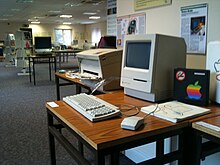
A computer museum is devoted to the study of historic computer hardware and software, where a "museum" is a "permanent institution in the service of society and of its development, open to the public, which acquires, conserves, researches, communicates, and exhibits the tangible and intangible heritage of humanity and its environment, for the purposes of education, study, and enjoyment", as defined by the International Council of Museums.
Some computer museums exist within larger institutions, such as the Science Museum in London, United Kingdom; and the Deutsches Museum in Munich, Germany. Others are dedicated specifically to computing, such as:
- the Computer History Museum in Mountain View, California, United States.
- the American Computer & Robotics Museum in Bozeman, Montana, United States.
- The National Museum of Computing at Bletchley Park, United Kingdom.
- The Centre for Computing History in Cambridge, United Kingdom
- the Nexon Computer Museum in Jeju Province. South Korea. (Full article...)
Subcategories
Subtopics
Lists
- Museums
- Most visited museums (by region)
- Art museums: most visited, largest
Types
- Art museum
- Agricultural museum
- Archaeology museum
- Architecture museum
- Artillery museum
- Aviation museum
- Biographical museum
- Cabinet of curiosities
- Ceramics museum
- Children's museum
- Community museum
- Computer museum
- Design museum
- Dime museum
- Ecomuseum
- Economuseum
- Ethnographic village
- Farm museum
- Fashion museum
- Folk museum
- Food museum
- Green museum
- Hair museum
- Hall of Memory
- Heritage centre
- Historic house museum
- Human rights museum
- Imaginarium
- Interpretation centre
- Jewish museum
- Lapidarium
- Lighthouse museum
- Living museum
- Local museum
- Maritime museum
- Migration museum
- Mobile museum
- Museum ship
- National history museum
- Natural history museum
- Open-air museum
- Palace museum
- Postal museum
- Prefectural museum
- Print room
- Private museum
- Regimental museum
- Schatzkammer
- Science fiction libraries and museums
- Science museum
- Sex museum
- Sculpture garden
- Technology museum
- Textile museum
- Torture museum
- Toy museum
- Transport museum (list)
- University museum
- Virtual museum
- Wax museum
- Writer's home
Related
Associated Wikimedia
The following Wikimedia Foundation sister projects provide more on this subject:
-
 Commons
Commons
Free media repository -
 Wikibooks
Wikibooks
Free textbooks and manuals -
 Wikidata
Wikidata
Free knowledge base -
 Wikinews
Wikinews
Free-content news -
 Wikiquote
Wikiquote
Collection of quotations -
 Wikisource
Wikisource
Free-content library -
 Wikiversity
Wikiversity
Free learning tools -
 Wiktionary
Wiktionary
Dictionary and thesaurus
-

-

-

-

-
Random portal
Purge server cache





